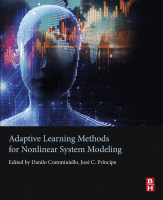Browse content
Table of contents
Actions for selected chapters
- Full text access
- Book chapterAbstract only
Chapter 1 - Introduction
Danilo Comminiello and José C. Príncipe
Pages 1-11 - Book chapterNo access
Index
Pages 361-367
About the book
Description
Adaptive Learning Methods for Nonlinear System Modeling presents some of the recent advances on adaptive algorithms and machine learning methods designed for nonlinear system modeling and identification. Real-life problems always entail a certain degree of nonlinearity, which makes linear models a non-optimal choice. This book mainly focuses on those methodologies for nonlinear modeling that involve any adaptive learning approaches to process data coming from an unknown nonlinear system. By learning from available data, such methods aim at estimating the nonlinearity introduced by the unknown system. In particular, the methods presented in this book are based on online learning approaches, which process the data example-by-example and allow to model even complex nonlinearities, e.g., showing time-varying and dynamic behaviors. Possible fields of applications of such algorithms includes distributed sensor networks, wireless communications, channel identification, predictive maintenance, wind prediction, network security, vehicular networks, active noise control, information forensics and security, tracking control in mobile robots, power systems, and nonlinear modeling in big data, among many others.
This book serves as a crucial resource for researchers, PhD and post-graduate students working in the areas of machine learning, signal processing, adaptive filtering, nonlinear control, system identification, cooperative systems, computational intelligence. This book may be also of interest to the industry market and practitioners working with a wide variety of nonlinear systems.
Adaptive Learning Methods for Nonlinear System Modeling presents some of the recent advances on adaptive algorithms and machine learning methods designed for nonlinear system modeling and identification. Real-life problems always entail a certain degree of nonlinearity, which makes linear models a non-optimal choice. This book mainly focuses on those methodologies for nonlinear modeling that involve any adaptive learning approaches to process data coming from an unknown nonlinear system. By learning from available data, such methods aim at estimating the nonlinearity introduced by the unknown system. In particular, the methods presented in this book are based on online learning approaches, which process the data example-by-example and allow to model even complex nonlinearities, e.g., showing time-varying and dynamic behaviors. Possible fields of applications of such algorithms includes distributed sensor networks, wireless communications, channel identification, predictive maintenance, wind prediction, network security, vehicular networks, active noise control, information forensics and security, tracking control in mobile robots, power systems, and nonlinear modeling in big data, among many others.
This book serves as a crucial resource for researchers, PhD and post-graduate students working in the areas of machine learning, signal processing, adaptive filtering, nonlinear control, system identification, cooperative systems, computational intelligence. This book may be also of interest to the industry market and practitioners working with a wide variety of nonlinear systems.
Key Features
- Presents the key trends and future perspectives in the field of nonlinear signal processing and adaptive learning.
- Introduces novel solutions and improvements over the state-of-the-art methods in the very exciting area of online and adaptive nonlinear identification.
- Helps readers understand important methods that are effective in nonlinear system modelling, suggesting the right methodology to address particular issues.
- Presents the key trends and future perspectives in the field of nonlinear signal processing and adaptive learning.
- Introduces novel solutions and improvements over the state-of-the-art methods in the very exciting area of online and adaptive nonlinear identification.
- Helps readers understand important methods that are effective in nonlinear system modelling, suggesting the right methodology to address particular issues.
Details
ISBN
978-0-12-812976-0
Language
English
Published
2018
Copyright
Copyright © 2018 Elsevier Inc. All rights reserved.
Imprint
Butterworth-Heinemann
